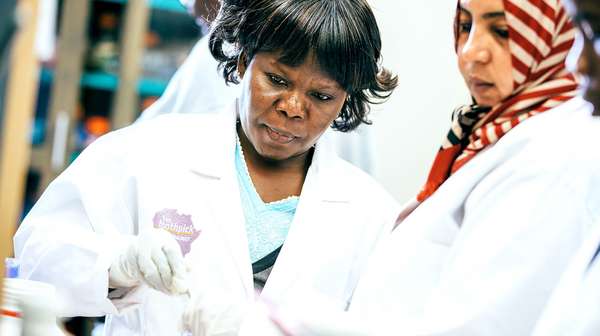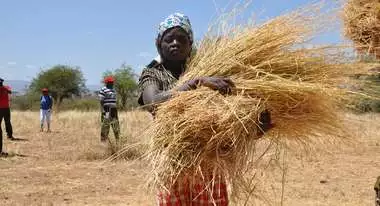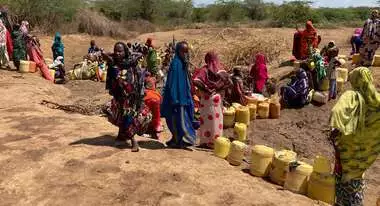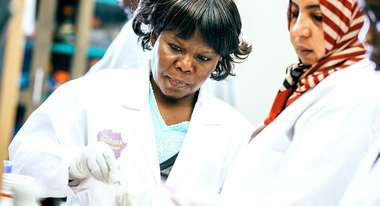Welthungerhilfe’s Toothpick Project was announced as one of the 50 Best Small Businesses of the “Good Food for All” competition.
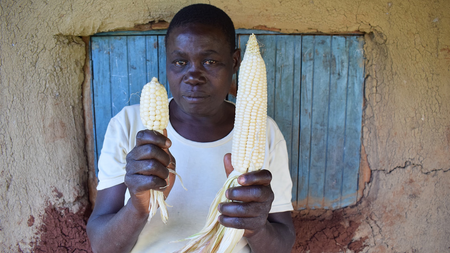
The Toothpick Project
40 million farms in Africa are facing a huge threat to food security: Striga. This parasitic weed looks innocent with its purple blooms but it can cause enormous damage of up to 100% to the crops it infests, leaving smallholder farmers with little food and income.
+++ News: New biopesticide to fight Striga approved for commercialization +++
After a dozen years of research and testing, the biological herbicide Kichawi KillTM was approved for commercial use against Striga (commonly known as Kichawi, witchweed) by the Kenya Pest Control Product Board (PCPB) on 26 February 2021. Striga is one of the worst pests threatening food security in sub-Saharan Africa. It attacks the roots of crops such as maize, sorghum and millet, reducing crop yields by 20-100%. In a first step, the fungus-based product is now being made available to farmers in western Kenya.
A biological solution with great impact
The main objective of the Toothpick Project is to create a biological solution to this problem. Originally developed at the Montana State University by Prof. David Sands, the technology uses specifically selected fungal strains to fight Striga. These fungal strains are harmless to humans and animals and specifically attack the weed rather than the crop, allowing farmers to treat striga-infested fields and secure a good yield of their staple food crop.
During a pilot project in Kenya, farmers planted rice substrate inoculated with the fungal FOXY T14 strains together with the maize crop seeds. At the end of the growing season, crop yields increased by more than 50 % on average compared to untreated plots; this amount not only contributes to food self-sufficiency, but also offers farmers the opportunity to increase their income by selling the surplus crop.
From lab to farmer’s field
- In a manufacturing lab of our Kenyan partner KALRO, scientists select, isolate and cultivate a Fusarium strain native to Kenya called FOXY T14.
- FOXY T14 is grown into a piece of wood (in the beginning toothpicks were used, hence the name of the project) and the fungus burrows into the wood. The pieces of wood are sealed in sterile boxes and delivered to the farmers.
- At the village level, trained inoculum producers (farmers) cook a pot of rice, put it in a sterilised container with a plastic lid, add the fungus-bearing wood, and seal the lid. They do this three days before planting their fields.
- Twice a day, for three days, the farmers shake the mixture, allowing for the FOXY T14 to grow onto the rice, creating the secondary inoculum.
- Half a teaspoon of the secondary inoculum is placed next to the seed into each seed hole.
- From there, the crop grows regularly, Striga-protected.
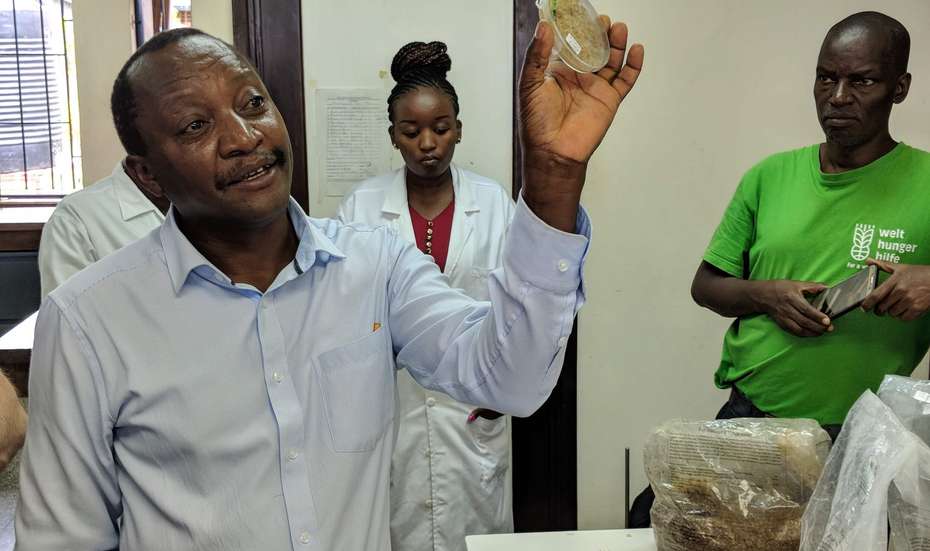
The Toothpick Company
In 2016, Welthungerhilfe launched a pilot project as a social enterprise in Kenya, and in 2018 the Toothpick Company Limited was registered as part of this sustainability strategy. In over 500 demonstration plots in western Kenya farmers were familiarized with the technology and experimented its impact. After 3 years of efficacy trials the product registration in Kenya is now granted for the product Kichawi Kill (the trademarked and registered name of FOXY T14 in Kenya). The Toothpick Company is an example of a public-private partnership, working closely with Welthungerhilfe, the researchers in Montana and the Kenya Agriculture & Livestock Research Organization.
Outlook
The future strategy is to scale up the Toothpick Project approach, initially in western Kenya, with plans to expand to other regions and countries in Africa in the near future.
In the next years we aim to expand the capacity of the Toothpick Company Ltd. to establish a functional last mile distribution system from lab-to-field to achieve easy and cost-effective technology access for the farmers. We will train village-entrepreneurs to become community-based inoculum producers, and the Toothpick Company will ensure their access to the Fusarium inoculum so that they can sell the final product to farmers in good quality at an affordable price.
For a longer-term perspective, a network of African biocontrol scientists is build up by Prof. Sands to transfer the bioherbicide technology from our pilot project in Kenya to other Striga-diseased countries.
Welthungerhilfe invests in the Toothpick Company
With funding support from Dr Peter Lüth and the DBU (German Environmental Foundation) Welthungerhilfe launched the Kenyan Toothpick Project in 2017. As one of the three lead shareholders of the Kenyan Toothpick Company Limited, a Welthungerhilfe representative sits on the board of directors and serves as the board chair. The other board members are Dr Peter Lüth and Claire Baker Sands, the daughter of Prof. David Sands. The Toothpick Company was Welthungerhilfe’s first shareholder participation in a social enterprise, setting the precedent for us to invest in other enterprise ventures.
Q&As
The Toothpick Project answers some common questions that have been asked by people interested in their technology and company.




